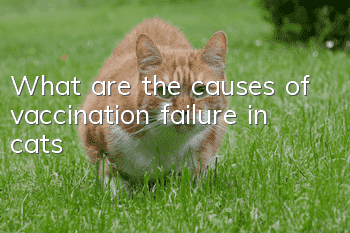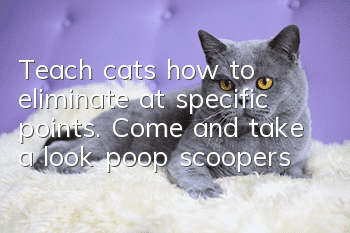What are the causes of vaccination failure in cats?

Cats have a complete immune program after birth. When we take newborn cats to the pet hospital, doctors often tell us how long it will take to get vaccinated. Through vaccination, cats can be protected from some serious infectious diseases. The harm, but can we think that everything will be fine after the cat is vaccinated? This is not the case. The cat’s vaccination may also fail for some reasons, causing the cat to become infected with the disease.
1. The interval between vaccination and exposure to infectious diseases is too short
The vaccine does not immediately stimulate the body to produce antibodies as soon as it is vaccinated. The vaccine works in the cat's body and producing antibodies in the body is a complex process, which often takes several days to weeks to produce effective antibodies. For example, against coronavirus, effective protection does not develop until 2-3 weeks after the second vaccine injection. If the cat is already in the incubation period of the disease for some reason before being vaccinated, or the owner does not pay attention to the cat's general care, and the cat has severe parasitic infection, the cat will inevitably become ill after vaccination, leading to the failure of immunity. Therefore, before vaccination, you must first have a detailed understanding of the cat's condition. If the cat has been infected with some diseases, it is best not to vaccinate.
2. Vaccine damage
This is an immune failure caused by some man-made or irresistible strains. It is often due to improper storage or transportation. For example, if it is knocked over and spilled during transportation, or improperly maintained, the attenuated vaccine may be inactivated and occur. Immunity failure. Generally, vaccines should be used as soon as possible after purchase. Large quantities that cannot be used up quickly should be stored in a low temperature, dark, and dry place. Inactivated bacteria (dead vaccines), weakened bacterial vaccines, toxoids, immune serum, etc. should be stored at 2 to 15°C to prevent freezing; attenuated viral vaccines should be placed below 0°C and frozen. The diluent is stored separately and is generally stored at room temperature. If the temperature is higher than 4℃ during the transportation of the vaccine, the vaccine will also lose effectiveness.
3. Improper immunization procedures
If the injection interval is too short, interference will occur between vaccines. If the interval is too long, the effect will be reduced. The correct vaccination program for cats should be to inject the first dose of Feline Triplex starting from the 9th week, with boosters every 3 to 4 weeks. Once, the basic immunization injection for cats is 2 to 3 times in the first year. Kittens can also be vaccinated against rabies only when they are 3 months old or older, once in the first year, and then once every 11 months.
4. Immunodeficiency
If the body’s immune system is defective and cannot produce a normal immune response to the vaccine, it will also fail. Congenital immunodeficiency in cats is mainly caused by feline immunodeficiency virus. The characteristic symptoms of cat immunodeficiency areStomatitis, gingivitis, and periodontitis, diarrhea or anemia may occur, as well as persistent upper respiratory tract infection and unexplained fever. There are also neurological symptoms such as behavioral changes, psychosis, dementia, facial distortions or tics. There is currently no effective treatment for immunodeficiency in cats, and treatment is usually aimed at controlling secondary bacterial infections.
As mentioned above, vaccination does not mean peace of mind. In medicine, when a vaccine does not protect against an infectious disease that has been prevented, it is called immune failure. Immune failure is generally rare, but it does not happen. It can be caused by problems with the vaccine itself, human factors, or the organism itself. Let’s continue to introduce the causes of immune failure. reason.
1. Different strains of viruses or bacteria
If the virus or bacterial strain mutates, the vaccination will also fail. Virus mutation is also a problem that needs to be paid attention to in vaccine preparation. For example, recently, a mutant strain of parvovirus was discovered clinically, and as a result, conventional parvovirus vaccination failed. The reasons for virus mutation are very complex. It may be caused by the virus's own genes, or it may be caused by stimulation from the external environment, such as some chemical or physical factors, which cause viral gene mutations. At the same time, the abuse of some drugs, such as antibiotics, can also cause viral resistance. Changes that reduce the immune effect.
2. The issue of maternal antibodies
Antibodies obtained from the mother through the placenta and colostrum are called maternal antibodies. Due to the presence of maternal antibodies, young kittens have strong resistance to certain diseases. When should you start vaccination? This is related to the level of maternal antibodies. The time that maternal antibodies circulate in the body is different in different individuals and different antibodies. Each individual has a susceptible period, varying in length from days to weeks, during which maternal antibody levels are too high to prevent vaccines from being effective but too low to provide sufficient protection against infectious disease. Even if you are vaccinated during this period, you can still get infectious diseases. The susceptibility periods are also different between different litters and even between different individuals in the same litter. Therefore, young cats should consider the interference of maternal antibodies and should be vaccinated according to the vaccine instructions. Generally, when a cat is twelve weeks old, the maternal antibodies in the body have dropped to non-interfering levels. The last vaccination against most infectious diseases should be at twelve weeks of age or later to make the cat protective.
3. Equipment used for immunization
During vaccination, attention should also be paid to the equipment used for immunization. Needles and syringes must be sterilized first. Unsterilized syringes, needles and droppers will reduce the performance of the vaccine; when diluting the vaccine, unsterilized or contaminated diluent It will cause the vaccine to be impure; at the same time, distilled water should be used during preparation. Using chlorine-containing tap water to dilute the vaccine will reduce the immune activity of the vaccine and cause immune failure. These factors can be avoided, as long as we keep an open mind.
IV. Improper use of vaccines
The vaccination route is not carried out according to the requirements of the vaccine. For example, during vaccinationSome medicines need to be injected subcutaneously, while others need to be injected intramuscularly or intranasally. In addition, injections must be carried out according to the dose.
Finally, I believe everyone has heard of the word protection rate. We often hear news talking about the protection rate of influenza A vaccine. This means that the vaccine’s protection against infectious diseases is not 100%, but there is a certain protection rate. . So even if your cat’s immune program is perfect, it doesn’t mean it’s 100% fine. You still need to pay attention to the prevention of some diseases.
- How to tell if cat moss is getting better soon
- Why do so few people keep Bengal cats?
- Will cats get parasites if they eat cockroaches?
- Common causes of excessive hair loss in cats
- How long can the third dose of cat vaccine be delayed?
- Are cats smarter than dogs? (Which is smarter, cats or dogs)
- What are the symptoms of rabies in cats?
- Can people who are allergic to cats still keep cats?
- Knowledge about cat anthelmintics that every poop collector must know
- Why does the cat suddenly become irritable?



